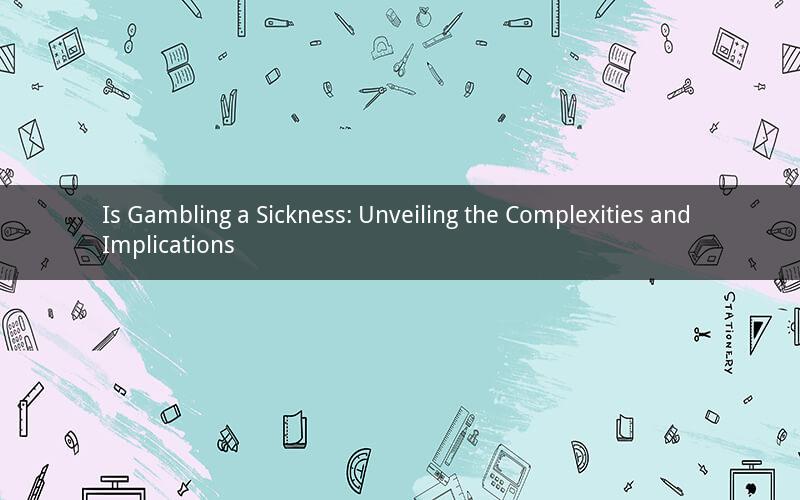
Introduction:
Gambling has been a topic of debate for centuries, with various opinions on whether it is a mere form of entertainment or a serious illness. This article delves into the complexities surrounding gambling and explores whether it can be classified as a sickness. We will examine the psychological, social, and economic aspects of gambling addiction and discuss the available treatments and prevention strategies.
1. Understanding Gambling:
Gambling is the act of betting money or something of value on an event with an uncertain outcome. It can take various forms, including lottery, sports betting, casino games, and poker. While many individuals engage in gambling without any negative consequences, others may develop a gambling addiction, leading to significant harm.
2. The Psychological Aspect:
Gambling addiction, also known as problem gambling or compulsive gambling, is characterized by an inability to control gambling behavior, despite negative consequences. Several psychological factors contribute to the development of gambling addiction, including:
- Impulse control disorders: Individuals with poor impulse control may find it challenging to resist the urge to gamble.
- Dopamine release: The brain's reward system is activated during gambling, leading to the release of dopamine, a neurotransmitter associated with pleasure and reinforcement.
- Psychological disorders: Certain mental health conditions, such as depression, anxiety, and substance abuse disorders, can increase the risk of developing a gambling addiction.
3. The Social Aspect:
Gambling addiction can have severe social consequences, affecting both the individual and their loved ones. Some social implications include:
- Financial problems: Compulsive gamblers may experience significant financial losses, leading to debt, bankruptcy, and even theft.
- Relationship issues: Gambling addiction can strain relationships, causing conflicts, emotional distress, and even separation or divorce.
- Work-related problems: Individuals with a gambling addiction may struggle with their work performance, leading to job loss or demotion.
4. The Economic Aspect:
Gambling addiction can have a significant economic impact on individuals, families, and society as a whole. Some economic implications include:
- Financial burden: Compulsive gamblers may accumulate substantial debt, which can lead to financial ruin and negatively impact their economic well-being.
- Healthcare costs: The physical and mental health consequences of gambling addiction can result in increased healthcare costs.
- Lost productivity: Individuals with a gambling addiction may experience decreased productivity at work, leading to economic losses for employers and the broader economy.
5. Treatment and Prevention:
Recognizing that gambling addiction is a serious condition, several treatment and prevention strategies are available:
- Therapy: Cognitive-behavioral therapy (CBT) and motivational interviewing (MI) are effective treatments for gambling addiction. These therapies help individuals develop coping skills and address underlying psychological factors.
- Support groups: Joining support groups, such as Gamblers Anonymous, can provide individuals with a sense of community and support while overcoming their addiction.
- Prevention strategies: Education and awareness campaigns can help reduce the prevalence of gambling addiction. Schools, communities, and workplaces can implement programs aimed at promoting responsible gambling and identifying at-risk individuals.
6. Conclusion:
In conclusion, gambling addiction is a complex issue that affects individuals, families, and society. While it is not yet classified as a standalone mental health disorder, the psychological, social, and economic consequences of gambling addiction are undeniable. Recognizing the seriousness of gambling addiction and implementing effective treatment and prevention strategies are crucial in addressing this growing problem.
Questions and Answers:
1. Q: Can gambling addiction be treated?
A: Yes, gambling addiction can be treated through various methods, including therapy, support groups, and prevention strategies.
2. Q: What are the signs of gambling addiction?
A: Signs of gambling addiction include an inability to control gambling behavior, lying about gambling activities, neglecting responsibilities, and experiencing negative consequences due to gambling.
3. Q: How can I prevent gambling addiction?
A: To prevent gambling addiction, it is essential to be aware of the risks, set limits on gambling activities, and seek support if needed. Educating yourself and others about responsible gambling is also crucial.
4. Q: Is there a genetic component to gambling addiction?
A: Yes, research suggests that genetics play a role in the development of gambling addiction. Individuals with a family history of addiction may be at a higher risk.
5. Q: Can gambling addiction be cured?
A: While there is no permanent cure for gambling addiction, it can be effectively managed and controlled through appropriate treatment and support. Recovery from gambling addiction is a lifelong process.